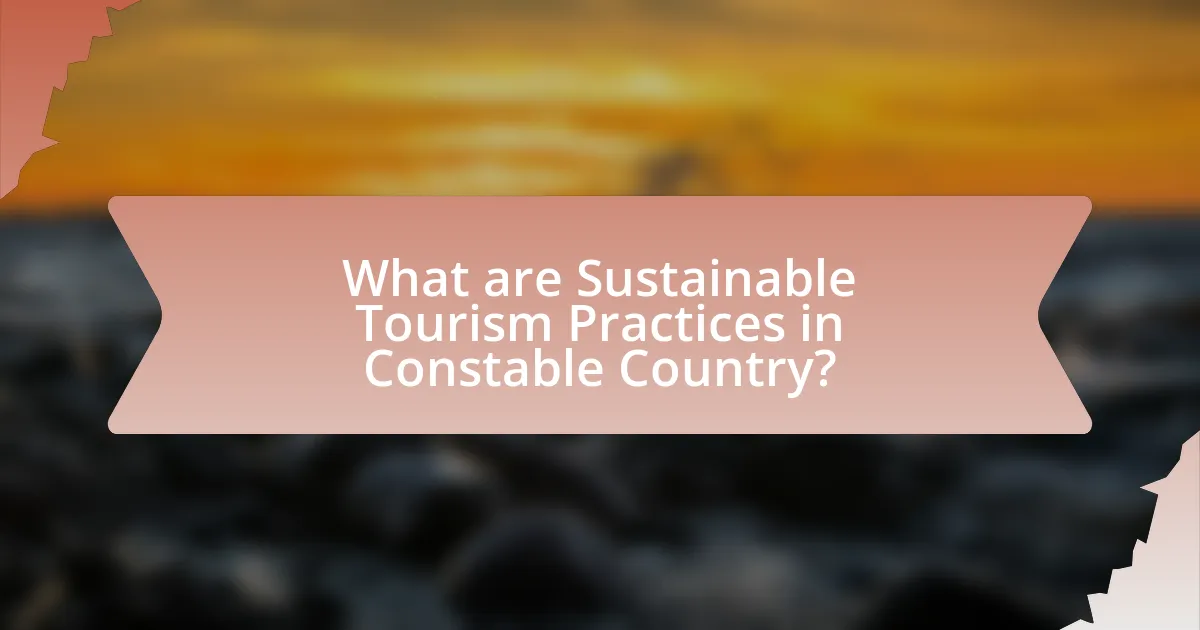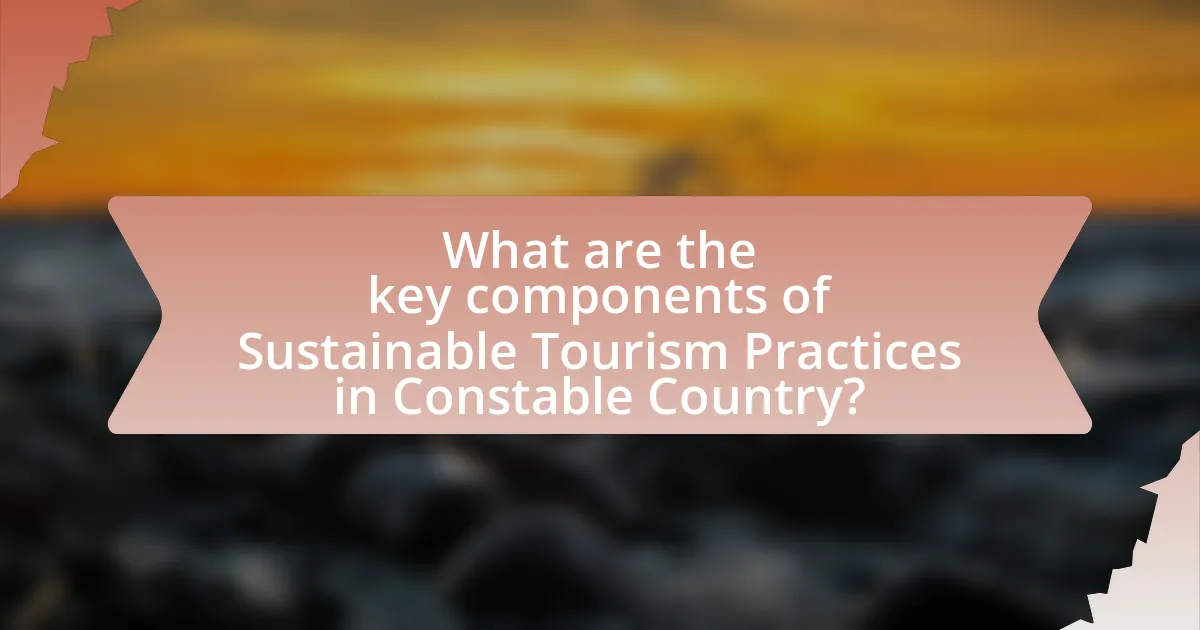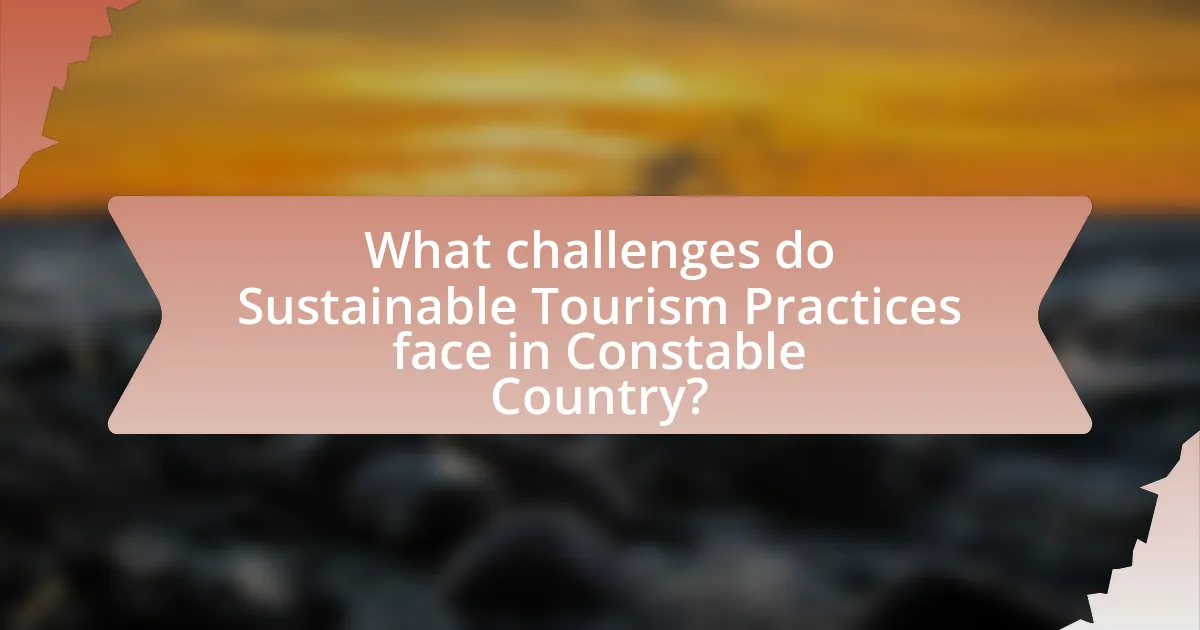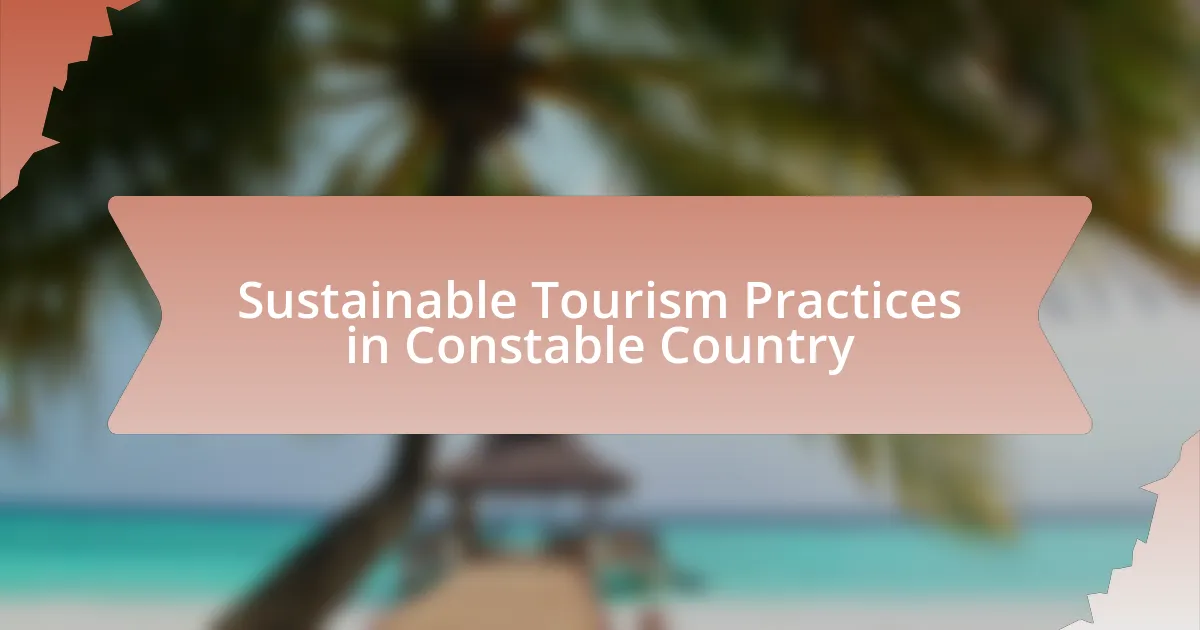Sustainable tourism practices in Constable Country focus on promoting local culture, conserving natural resources, and minimizing environmental impact. Key initiatives include supporting local businesses, implementing eco-friendly transportation options, and engaging visitors with the community. These practices address environmental issues such as habitat degradation and pollution while enhancing economic growth and cultural preservation. The article explores the benefits of sustainable tourism for local ecosystems and communities, the challenges faced in its implementation, and practical tips for travelers to support these initiatives.

What are Sustainable Tourism Practices in Constable Country?
Sustainable tourism practices in Constable Country include promoting local culture, conserving natural resources, and minimizing environmental impact. These practices are evident through initiatives such as supporting local businesses, encouraging visitors to engage with the community, and implementing eco-friendly transportation options. For instance, the use of electric vehicles and cycling routes helps reduce carbon emissions while allowing tourists to explore the area sustainably. Additionally, conservation efforts focus on protecting local wildlife and habitats, ensuring that tourism does not compromise the region’s natural beauty. These practices are essential for maintaining the integrity of Constable Country as a destination while fostering economic growth and environmental stewardship.
How do these practices contribute to environmental conservation?
Sustainable tourism practices in Constable Country contribute to environmental conservation by minimizing ecological footprints and promoting biodiversity. These practices include responsible waste management, which reduces pollution and protects local ecosystems, and the use of renewable energy sources, which decreases reliance on fossil fuels. For instance, studies show that eco-friendly accommodations can reduce energy consumption by up to 30%, thereby lowering greenhouse gas emissions. Additionally, sustainable tourism often involves educating visitors about local wildlife and habitats, fostering a culture of conservation that encourages the protection of natural resources. This holistic approach not only preserves the environment but also enhances the overall visitor experience, creating a sustainable model for tourism that benefits both nature and local communities.
What specific environmental issues do these practices address?
Sustainable tourism practices in Constable Country specifically address issues such as habitat degradation, pollution, and resource depletion. These practices aim to minimize the environmental footprint of tourism by promoting conservation efforts, reducing waste, and encouraging the use of renewable resources. For instance, initiatives like guided eco-tours help protect local wildlife habitats while educating visitors on the importance of biodiversity. Additionally, implementing waste management systems reduces litter and pollution in natural areas, thereby preserving the landscape’s integrity.
How do local ecosystems benefit from sustainable tourism?
Local ecosystems benefit from sustainable tourism by promoting conservation efforts and enhancing biodiversity. Sustainable tourism practices, such as responsible wildlife viewing and habitat preservation, help protect natural resources and reduce environmental degradation. For instance, a study by the World Wildlife Fund indicates that ecotourism can generate significant funding for conservation projects, leading to improved management of protected areas. Additionally, sustainable tourism fosters community engagement, encouraging local populations to participate in preserving their ecosystems, which further supports biodiversity and ecological health.
Why is sustainable tourism important for local communities?
Sustainable tourism is important for local communities because it promotes economic growth while preserving cultural and environmental integrity. By prioritizing local resources and minimizing ecological impact, sustainable tourism helps create jobs, supports local businesses, and fosters community engagement. For instance, a study by the United Nations World Tourism Organization found that sustainable tourism can generate up to 10% of global GDP and create millions of jobs, particularly in rural areas. This economic benefit is coupled with the preservation of local traditions and ecosystems, ensuring that communities can thrive without sacrificing their heritage or environment.
What economic benefits does sustainable tourism bring to Constable Country?
Sustainable tourism brings significant economic benefits to Constable Country by enhancing local employment opportunities and increasing revenue for small businesses. This form of tourism encourages visitors to engage with local culture and products, leading to a rise in demand for services such as accommodations, restaurants, and guided tours. For instance, a report by the East Suffolk Council indicates that sustainable tourism initiatives have contributed to a 15% increase in local business revenue over the past three years. Additionally, sustainable practices attract a growing segment of eco-conscious travelers, further boosting the region’s economic resilience and promoting long-term financial stability for the community.
How does sustainable tourism enhance cultural preservation?
Sustainable tourism enhances cultural preservation by promoting responsible travel practices that respect and protect local traditions and heritage. This approach encourages tourists to engage with local communities, fostering an appreciation for cultural diversity and historical significance. For instance, sustainable tourism initiatives often include cultural education programs that inform visitors about local customs, arts, and crafts, which helps to sustain these practices. Additionally, studies show that regions that prioritize sustainable tourism see increased funding for cultural heritage projects, as tourism revenue can be reinvested into preserving historical sites and supporting local artisans. This symbiotic relationship between tourism and cultural preservation ensures that local identities are maintained while providing economic benefits to communities.

What are the key components of Sustainable Tourism Practices in Constable Country?
The key components of Sustainable Tourism Practices in Constable Country include environmental conservation, community engagement, and responsible visitor management. Environmental conservation focuses on preserving natural landscapes and biodiversity, which is essential in Constable Country, known for its picturesque scenery and ecological significance. Community engagement involves collaborating with local residents to ensure that tourism benefits them economically and socially, fostering a sense of ownership and pride in their heritage. Responsible visitor management emphasizes minimizing the ecological footprint of tourists through education and sustainable practices, ensuring that the area’s cultural and natural resources are protected for future generations. These components collectively contribute to a balanced approach to tourism that respects both the environment and local communities.
What types of sustainable tourism initiatives are implemented?
Sustainable tourism initiatives implemented in Constable Country include eco-friendly accommodations, community-based tourism, and conservation programs. Eco-friendly accommodations focus on minimizing environmental impact through energy efficiency, waste reduction, and sustainable sourcing of materials. Community-based tourism initiatives engage local residents in tourism activities, ensuring that economic benefits support the community and preserve cultural heritage. Conservation programs aim to protect natural resources and wildlife, often involving partnerships with local organizations to promote biodiversity and sustainable land use practices. These initiatives collectively contribute to the preservation of Constable Country’s unique landscapes and cultural identity.
How do eco-friendly accommodations contribute to sustainability?
Eco-friendly accommodations contribute to sustainability by minimizing environmental impact through energy efficiency, waste reduction, and resource conservation. These establishments often utilize renewable energy sources, such as solar or wind power, which significantly lowers carbon emissions. For example, a study by the Global Sustainable Tourism Council found that hotels implementing energy-efficient technologies can reduce energy consumption by up to 30%. Additionally, eco-friendly accommodations frequently promote water conservation practices, such as low-flow fixtures and rainwater harvesting, further supporting sustainable resource management. By prioritizing local sourcing and organic products, these accommodations also help reduce transportation emissions and support local economies, reinforcing the principles of sustainable tourism.
What role do local guides play in promoting sustainable tourism?
Local guides play a crucial role in promoting sustainable tourism by providing authentic experiences that respect local cultures and environments. They educate tourists about the ecological and cultural significance of the areas they visit, fostering a sense of responsibility and awareness. For instance, local guides often share knowledge about native flora and fauna, traditional practices, and conservation efforts, which encourages visitors to appreciate and protect these resources. Additionally, studies have shown that communities with active local guides see increased economic benefits from tourism, as these guides often direct visitors to local businesses, thereby supporting the local economy and promoting sustainable practices.
How is visitor education integrated into sustainable tourism practices?
Visitor education is integrated into sustainable tourism practices by providing information and resources that promote environmental awareness and responsible behavior among tourists. This integration occurs through guided tours, informational signage, workshops, and digital platforms that educate visitors about local ecosystems, cultural heritage, and conservation efforts. For instance, in Constable Country, local tourism organizations often collaborate with environmental groups to develop educational programs that highlight the importance of preserving natural landscapes and wildlife. Research indicates that informed visitors are more likely to engage in sustainable practices, such as minimizing waste and respecting wildlife, thereby enhancing the overall sustainability of tourism in the region.
What programs are in place to educate tourists about local ecology?
Programs in Constable Country that educate tourists about local ecology include guided nature walks, interactive workshops, and educational signage in natural areas. These initiatives aim to enhance visitors’ understanding of the region’s unique ecosystems and biodiversity. For instance, local organizations often conduct guided tours led by knowledgeable naturalists who explain the significance of various plant and animal species, as well as the importance of conservation efforts. Additionally, workshops may focus on sustainable practices, such as wildlife photography or native plant gardening, fostering a deeper appreciation for the local environment. Educational signage throughout parks and reserves provides information on ecological features, promoting awareness and responsible behavior among tourists.
How do educational initiatives impact tourist behavior?
Educational initiatives significantly influence tourist behavior by enhancing awareness and promoting responsible practices. When tourists are educated about local ecosystems, cultural heritage, and sustainable practices, they are more likely to engage in behaviors that support conservation efforts. For instance, studies show that tourists who participate in educational programs are 30% more likely to choose eco-friendly accommodations and activities. This shift in behavior not only benefits the environment but also supports local economies by encouraging sustainable tourism practices.

What challenges do Sustainable Tourism Practices face in Constable Country?
Sustainable tourism practices in Constable Country face challenges such as environmental degradation, seasonal visitor fluctuations, and local community engagement. Environmental degradation occurs due to increased foot traffic and infrastructure development, which can harm natural landscapes and biodiversity. Seasonal visitor fluctuations lead to over-tourism during peak times, straining local resources and services, while under-utilization in off-peak seasons can impact economic stability. Additionally, engaging local communities in sustainable practices is often difficult, as there may be a lack of awareness or conflicting interests between tourism development and community needs. These challenges hinder the effective implementation of sustainable tourism initiatives in the region.
What are the main obstacles to implementing sustainable tourism?
The main obstacles to implementing sustainable tourism include lack of funding, insufficient infrastructure, and resistance from local communities. Lack of funding limits the ability to develop sustainable projects, as many initiatives require significant financial investment to be effective. Insufficient infrastructure, such as inadequate transportation and waste management systems, hinders the ability to support sustainable practices. Additionally, resistance from local communities often arises due to concerns about economic impacts and changes to traditional lifestyles, which can impede the acceptance and success of sustainable tourism initiatives. These factors collectively create significant challenges in promoting and establishing sustainable tourism in regions like Constable Country.
How does seasonal tourism affect sustainability efforts?
Seasonal tourism negatively impacts sustainability efforts by creating peaks in resource consumption and environmental stress during high visitor influx periods. This surge can lead to overuse of natural resources, increased waste generation, and habitat degradation, particularly in sensitive areas. For instance, a study by the World Tourism Organization indicates that destinations experiencing high seasonal tourism often struggle to manage waste and water resources effectively, resulting in pollution and ecosystem disruption. Additionally, local communities may face challenges in maintaining infrastructure and services, which can undermine long-term sustainability goals.
What role does government policy play in supporting or hindering sustainable practices?
Government policy plays a crucial role in either supporting or hindering sustainable practices by establishing regulations, incentives, and frameworks that guide environmental stewardship. For instance, policies that promote renewable energy use and conservation efforts can enhance sustainable tourism by encouraging businesses to adopt eco-friendly practices. Conversely, lack of stringent regulations or incentives can lead to unsustainable practices, such as overdevelopment or resource depletion, which negatively impact local ecosystems and tourism viability. Evidence from various studies indicates that regions with supportive government policies, such as tax breaks for sustainable initiatives, experience higher levels of investment in sustainable tourism, demonstrating the significant influence of policy on practice.
How can these challenges be overcome?
To overcome the challenges of sustainable tourism practices in Constable Country, stakeholders must implement comprehensive management strategies that prioritize environmental conservation and community engagement. Effective measures include establishing strict regulations on visitor numbers to prevent overcrowding, promoting eco-friendly transportation options, and encouraging local businesses to adopt sustainable practices. For instance, research by the World Tourism Organization indicates that destinations with regulated tourism experience less environmental degradation and improved local economies. Additionally, fostering partnerships between local governments, businesses, and conservation organizations can enhance resource management and promote awareness of sustainable practices among tourists.
What best practices can be adopted to enhance sustainability?
To enhance sustainability in tourism, adopting practices such as minimizing waste, promoting local culture, and conserving natural resources is essential. Implementing waste reduction strategies, such as encouraging recycling and composting, can significantly decrease the environmental impact of tourism. For instance, a study by the World Tourism Organization indicates that effective waste management can reduce tourism-related waste by up to 30%. Additionally, promoting local culture through community engagement and supporting local businesses fosters economic sustainability while preserving cultural heritage. Conservation efforts, such as protecting natural habitats and wildlife, are crucial; research shows that sustainable tourism can lead to a 20% increase in biodiversity in protected areas. These best practices collectively contribute to a more sustainable tourism model in Constable Country.
How can community involvement improve sustainable tourism outcomes?
Community involvement can significantly improve sustainable tourism outcomes by fostering local stewardship and enhancing visitor experiences. When communities actively participate in tourism planning and management, they ensure that tourism development aligns with local values and environmental conservation efforts. For instance, a study by the United Nations World Tourism Organization found that destinations with strong community engagement report higher satisfaction rates among tourists and better preservation of cultural and natural resources. This collaborative approach not only empowers residents but also leads to more authentic and responsible tourism practices, ultimately benefiting both the community and visitors.
What practical tips can travelers follow to support sustainable tourism in Constable Country?
Travelers can support sustainable tourism in Constable Country by choosing local accommodations, utilizing public transport, and respecting natural habitats. Staying in locally-owned lodgings helps boost the local economy and reduces the carbon footprint associated with large hotel chains. Using public transport or cycling minimizes vehicle emissions, contributing to cleaner air and less congestion. Additionally, respecting natural habitats by sticking to marked trails and not disturbing wildlife preserves the area’s ecological integrity. These practices collectively enhance the sustainability of tourism in Constable Country.


